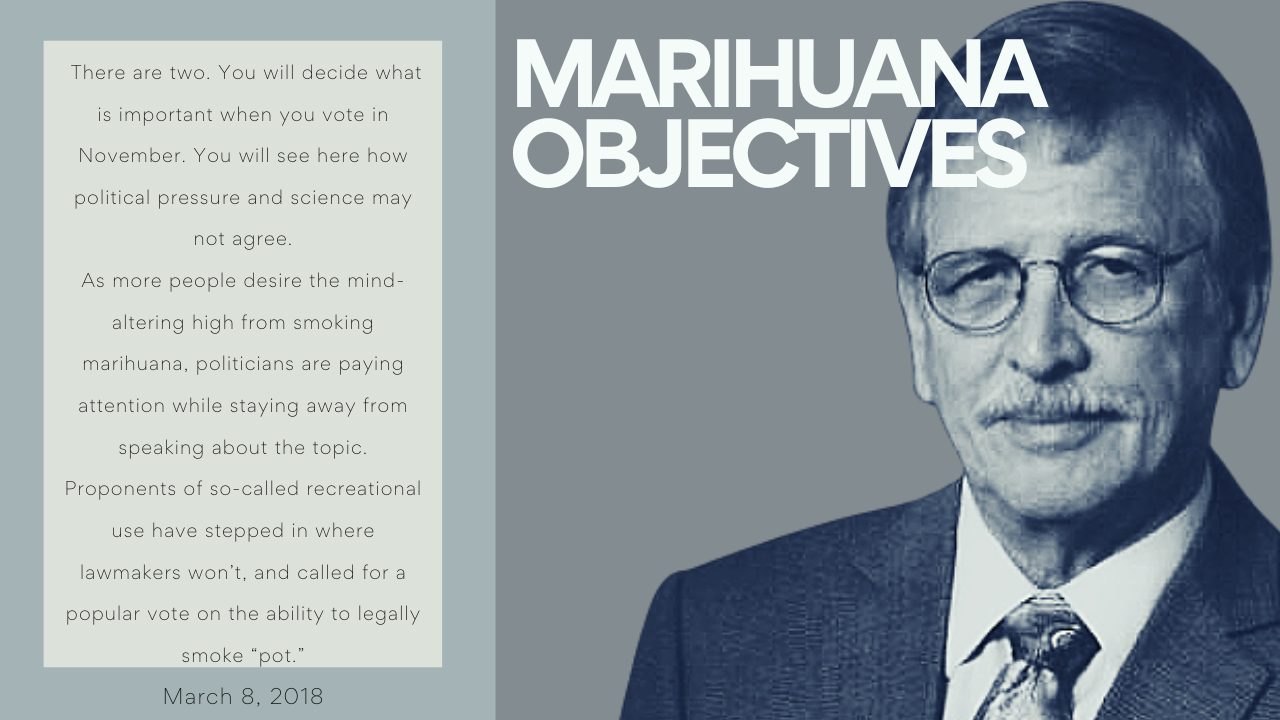Posted on November 17, 2022 View all news
Joe Tilton
March 8, 2018
There are two. You will decide what is important when you vote in November. You will see here how political pressure and science may not agree.
As more people desire the mind-altering high from smoking marihuana, politicians are paying attention while staying away from speaking about the topic. Proponents of so-called recreational use have stepped in where lawmakers won’t, and called for a popular vote on the ability to legally smoke “pot.” Petitions calling for a vote in the November 6th general election have been turned in with signatures being verified now. There is doubt that Michigan will look a lot more like Colorado next year. And, marihuana may have more effect on the election than legalizing its use.
Socially savvy proponents know, as does government, that we will agree to almost anything for children, war, and health. Recreation is not in that list. Health has been the issue marihuana believers have attached as the way to get you to agree to let this drug into our lives.
While medical cannabis holds some promise for relief of some ailments, such as pain, you have seen that the campaign for legalization does not stop with medical reasons, otherwise why would we be voting on “recreational” use?
A major reason for not having scientific evidence is that marihuana is still against federal law. Laboratories are prohibited from even studying the subject, meaning information has been coming from Great Britain and Australia. Recently, another study from within our borders is shedding light on understanding this substance that has been with humanity for millennia.
The National Academy of Sciences, Engineering and Medicine released their study last year. We have yet to see this or studies from other countries quoted by pro-marihuana forces. While not all negative, there are some issues explained that will be beneficial in making the right decision, as you interpret it, when you cast your ballot.
Nearly 100 conclusions have been reached by the academy and offer rigorous reviews of scientific papers from 1999 until now about the impact of chemical compounds known as cannabinoids. Answers have been sought, ranging from therapeutic effects to cancer-causing risks, mental health disorders and injuries. More than 10,000 scientific abstracts resulted in the academy’s findings, in spite of legal barriers from the federal government.
Marie McCormick, Chair of the Committee doing the study and review, wrote for the committee. “This growing acceptance, accessibility and use of cannabis, and its derivatives have raised important public-health concerns. Moreover, the lack of any aggregated knowledge of cannabis-related health effects has led to uncertainty about what, if any, are the harms or benefits from its use. We conducted an in-depth and broad review of the most recent research to establish firmly what the science says and to highlight areas that still need further explanation. As laws and policies continue to change, research must also.”
A nationwide survey of 22.2-million people, ages 12 and older, showed that 90-percent of adult cannabis use was “recreational.” Ten-percent said medical reason was their reason, and 36-percent combined reasons. Use by those 12 and above is increasing steadily from 6.2 to 8.3-percent.
Positive results from using cannabis and cannabinoids are treatment of pain in adults, with significant reduction in pain symptoms plus sclerosis-related muscle spasms were reduced from short-term use of oral cannabinoids. Another unquestioned benefit is reduction in nausea and vomiting after chemotherapy. These uses should be legalized now and available through normal pharmaceutical outlets.
Injury and death from use of marijuana has been studied in several categories, such as cancer, heart attacks, respiratory diseases, mental health, psychosocial, prenatal, neonatal and problem use, such as addiction. This is not a benign drug.
According to the latest and best research, states where marihuana use is legal, show increased risk of unintentional overdose among children. Seventy-eight percent of all overdose incidents were due to marihuana. States that legalized pot saw even higher rates of overdoses in children.
There is not sufficient evidence that marihuana causes cancer, yet the danger is that pot smokers often take up tobacco, which does result in high cancer rates. In that sense, it is a gateway drug.
There is evidence that smoking pot can trigger a heart attack.
Smoking cannabis regularly is associated with frequent chronic bronchitis, worsening respiratory issues, like chronic cough and phlegm, and quitting pot smoking reduces these conditions.
Risk of developing schizophrenia, psychoses and social anxiety disorders, and to a lesser extent, depression, is a side effect of marihuana use. Heavy users are more likely to have thoughts of suicide and bipolar disorders.
Initiating use of pot at a younger age increases the likelihood of problem cannabis use, or addiction.
Evidence is moderate that there is a link between marihuana and dependence on other things, like alcohol and other illicit drugs.
Learning, memory and attention are impaired immediately after use of pot. Limited evidence suggests that pot use is related to reduced academic achievement and education plus social relationships and roles. When used by youth, cognition development is most impacted. And, the life-long danger is increased rates of unemployment and low income.
Lower birth weight, smaller heads and other birth-defect issues are seen in children born of mothers who used cannabis.
The research on marihuana should be funded by the marihuana industry, but it’s not. This Schedule 1 drug is coming at us, and as reported in the last article, the big money, the Suits, are taking over. This does not mean the black market goes away—it remains and is growing in Colorado.
Taking marihuana away from users is not likely to happen because escaping from hardships of life has become the norm in our society and pot is their escape.
Now that you know what marihuana does to the average user who does not need it for pain suppression, will you recommend it to your child? Will you vote for it?

